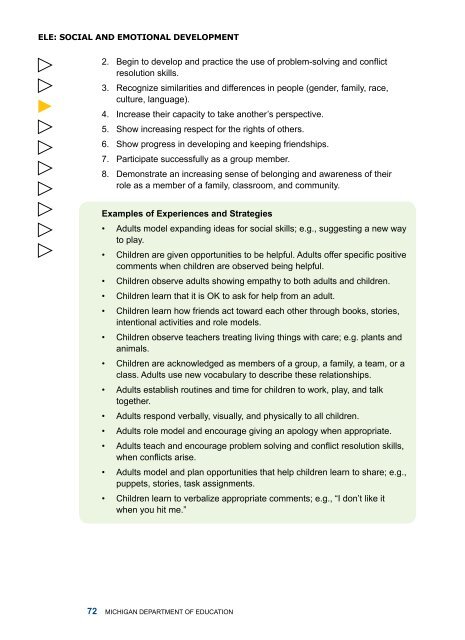Early Childhood Standards of Quality for ... - State of Michigan
Early Childhood Standards of Quality for ... - State of Michigan
Early Childhood Standards of Quality for ... - State of Michigan
You also want an ePaper? Increase the reach of your titles
YUMPU automatically turns print PDFs into web optimized ePapers that Google loves.
ELE: Social and Emotional Development2. Begin to develop and practice the use <strong>of</strong> problem-solving and conflictresolution skills.3. Recognize similarities and differences in people (gender, family, race,culture, language).4. Increase their capacity to take another’s perspective.5. Show increasing respect <strong>for</strong> the rights <strong>of</strong> others.6. Show progress in developing and keeping friendships.7. Participate successfully as a group member.8. Demonstrate an increasing sense <strong>of</strong> belonging and awareness <strong>of</strong> theirrole as a member <strong>of</strong> a family, classroom, and community.Examples <strong>of</strong> Experiences and Strategies• Adults model expanding ideas <strong>for</strong> social skills; e.g., suggesting a new wayto play.• Children are given opportunities to be helpful. Adults <strong>of</strong>fer specific positivecomments when children are observed being helpful.• Children observe adults showing empathy to both adults and children.• Children learn that it is OK to ask <strong>for</strong> help from an adult.• Children learn how friends act toward each other through books, stories,intentional activities and role models.• Children observe teachers treating living things with care; e.g. plants andanimals.• Children are acknowledged as members <strong>of</strong> a group, a family, a team, or aclass. Adults use new vocabulary to describe these relationships.• Adults establish routines and time <strong>for</strong> children to work, play, and talktogether.• Adults respond verbally, visually, and physically to all children.• Adults role model and encourage giving an apology when appropriate.• Adults teach and encourage problem solving and conflict resolution skills,when conflicts arise.• Adults model and plan opportunities that help children learn to share; e.g.,puppets, stories, task assignments.• Children learn to verbalize appropriate comments; e.g., “I don’t like itwhen you hit me.”72 <strong>Michigan</strong> Department <strong>of</strong> Education


